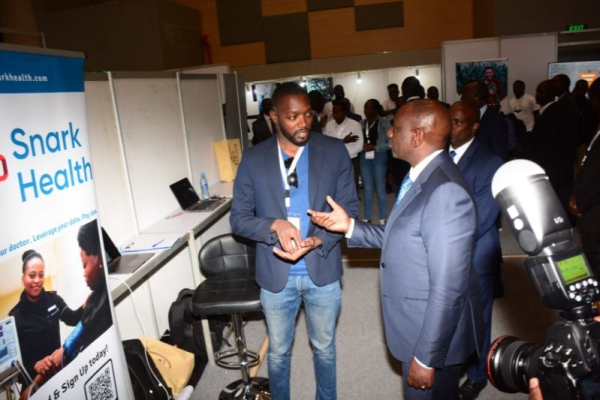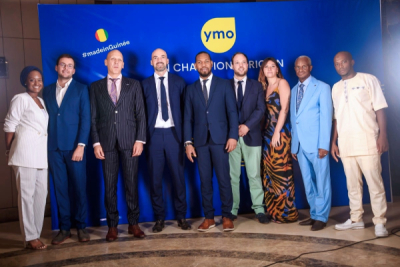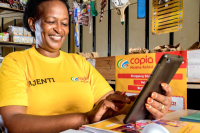
Solutions (581)
Tech tools have become essential to finding alternative solutions for some of the key challenges facing populations in Africa. In Kenya, a tech entrepreneur wants to help people quickly access quality healthcare in case of illness.
Snark Health is a digital solution developed by a Kenyan startup. It helps users consult doctors online, without paying a dime sometimes.
“Snark Health is the next generation of healthcare built around the Doctor-Patient relationship. We help patients improve their access to healthcare and lower their cost of care. We help doctors make more money,” the solution informs on its website.
Its services are accessible only through an Android app. Once they download the app, users can set up their accounts by filling in details like name, surname, phone number, email, blood type, blood pressure, etc. Those details give doctors the required information on patients before consultations.
Regardless of the social stratum to which the patient belongs, he or she can easily access care even without health insurance. To facilitate the process, Snark Health launched a cryptocurrency called Hippocratic Coin. Users can gradually save money for healthcare by buying the coins. When they need healthcare, they can exchange the coins to top-up their M-Pesa (mobile money) wallets to make payments.
For residents in rural areas with no or poor access to the internet, the solution has a USSD code they can dial to access its services.
In 2022, Snark Health was among the twelve startups to participate in the first cohort of the FAST accelerator program created to strengthen and evolve the African digital ecosystem. The program lasted 12 weeks and participants received $250,000 in Microsoft Azure cloud credits, access to Microsoft 365, Dynamics 365, OpenAI programming interfaces, and Microsoft for Startups Founders Hub.
Adoni Conrad Quenum
In Africa, a huge number of residents do not have the payment means accepted by most European e-commerce platforms. Shopmeaway was created to allow these residents to easily buy what they want.
Shopmeaway is an e-commerce platform developed by a Senegalese start-up. It allows users to easily purchase items on platforms like Amazon, Zara, and others.
"In Senegal, people want to buy from sites like Amazon, Zara, and H&M, but they do not deliver to Senegal and very often do not accept payments from Africa. This problem extends to all of Africa, but also to Latin America and Southeast Asia," says Shopmeaway founder, Racine Sarr.
On Shopmeaway’s web platform, users can set up their accounts to make purchases. The solution acts as an intermediary to facilitate the purchase of anything -from clothes, electronics, and cosmetics to smartphones or computers- from any platform. It usually delivers them between six to ten days.
It also allows local producers to set up virtual shops, where they can offer “Made in Senegal” products. In 2018, it received €100,000 in financing from the Senegalese government, through the youth and women entrepreneurship support agency DER/FJ. The funds were used to diversify services but, for the time being, the startup is not talking about expansion.
Adoni Conrad Quenum
Listed on the Nasdaq, it is undoubtedly one of the most important South African mobility startups.
Swvl is an e-mobility solution developed by an eponymous Egyptian start-up. It allows users to easily run their errands with round-the-clock rides. Based in Cairo, the startup behind the app was founded in 2017 by Mostafa Kandil, Ahmed Sabbah, Mahmoud Nouh, and Rafael Coronel.
Since its inception, it has raised about $264 million to accelerate its growth in Africa, Asia, Europe, and Latin America. It describes itself as a "tech-driven, affordable, and convenient transportation service, committed to enabling cities, people, and businesses to move everywhere."
Through its mobile app available for iOS, Android, and Huawei devices, users can create an account and book the many bus or van routes available to get to work, an appointment, or run errands.
The app presents the most frequented routes and users only have to choose the ones on their way. They can also combine routes if there are no straight routes to their destinations.
Since 2022, Swvl is experiencing rapid growth. After consecutive fundraisings, it is launched in 115 cities in 18 countries on four continents. The Android version of its app has been downloaded more than 10 million times. It claims more than 75 million rides booked and more than 20,000 drivers. In 2022, the startup got listed on Nasdaq, the second largest stock exchange in the U.S., with an IPO price of $9.95 per share.
Adoni Conrad Quenum
In Africa, online education is gradually picking up with the rise of internet and smartphone penetration. Since the coronavirus pandemic, the continent witnessed a rapid development of edtech startups offering ever-interesting solutions.
Edves is an edtech solution developed by a Nigerian start-up. It allows schools to automate the entire student journey and make course delivery and school administration more efficient.
“With Edves, Parents and Teachers can track and analyze Student journey using data on learning objectives and assessment to meet unique needs of the students. In addition to learning management capabilities, its features include; School Fees Payment (using USSD, Bank-to-Bank and Card payment methods) and other critical administrative activities,” the platform indicates.
From its web platform or its iOS and Android -downloaded more than 5,000 times according to Playstore data- apps, parents can keep an eye on their children’s progress. To do that, they need to set up their Edves accounts.
“Edves [...] allows customization per School with unique URL, School Fees Billing Schedule, Fees Collection, Lesson Notes, Color Theme, Report Templates per the School specification. The same software is powering the variations in market demands,” the platform explains.
The solution also makes life easier for teachers and school administrators. Like parents, teachers can monitor the students’ progress and apply particular measures when needed. It gives school authorities a global idea of performance and reports to parents when necessary.
As of 2022, the edtech solution was claiming adoption by more than 1,400 schools (with 269,262 students), 145,053 parents, 25,021 teachers, and 20,997 administrative members. It is present in about 10 countries and, in 2018, it received the Best Educational Technology Award in Switzerland with a $50,000 grant from the Jacobs Foundation. The same year, it landed its first investment of $120,000 from Chinook Capital and GC Fund CChub. In 2021, it also raised $575,000 to improve its technology and support its development to become a Pan-African edtech solution in the years to come.
Adoni Conrad Quenum
In Africa, access to healthcare is challenging in some areas. This is why so many healththech startups are being created to offer interesting solutions to ease access to that basic service.
CheckMe Health is a digital solution developed by an Egyptian startup. It allows users access to blood collection services in partner laboratories.
Checkme provides an “easy and smooth experience for everyone, from uploading prescriptions and getting Online Consultation to choosing from the best clinical labs around Egypt to book lab tests, PCR, and Scans and receive your results on your phone,” reads the solution’s web platform.
Through its mobile app (Android and iOS apps), a user can set up an account to access the services offered. He/she can select a medical test or download a prescription directly from the platform, compare the rates applied by the various partner laboratories, and then, book an appointment. Once the appointment is booked, a representative will come to collect the samples and the results will be sent to the mobile app when available.
In December 2022, the startup -which claims more than 100,000 CheckMe Health users- announced the acquisition of DoctorOnline, another healthtech that provides on-demand diagnostics.
According to CheckMeHealth co-founder Nesma El Talawy, “this acquisition falls in line with our expansion strategy in the region and with the expansion of our service offering. According to McKinsey Global Institute, the costs saved by Health-tech to the healthcare sector could lie between $1.5 trillion and $3 trillion a year by 2030, which makes acquisitions like this pivotal in their economic impact in the region.”
Adoni Conrad Quenum
At a time when bank account penetration rate is really low in Sub-Saharan Africa, a Guinean fintech wants to develop simple solutions that are accessible to every citizen and offer alternatives to traditional financial services.
Ymo is a fintech solution developed by a Guinean startup. It allows Africans and members of the diaspora to send and receive money in several countries in Africa and Europe.
Thanks to its mobile app accessible on iOS and Android, users can perform all their money transfer operations. They simply have to create their accounts and add beneficiaries to facilitate transfers. For every transfer, senders have to fill in recipients’ first and last names as well as their phone numbers.
"Ymo is a response to the expectations of our Guinean compatriots who live abroad or reside in the country, in Guinea. It is worth noting that the African diaspora is the continent’s leading donor. Yet, as of 2022, it is still difficult for that diaspora to send money to relatives. Ymo was created to address that issue,” said Ymo founder, Abdoulaye Barry, in 2022.
In addition to money transfers, Ymo allows users to easily pay for groceries or bills. The fintech has more than 5,000 relay points and more than 500,000 users in more than 30 countries in Africa and Europe. According to PlayStore data, the Android version of its mobile app has been downloaded more than 50,000 times. Currently, it operates in Guinea but, it plans to reach the whole continent and foster financial inclusion for over 1 billion people. For that purpose, it recently raised €3 million.
Adoni Conrad Quenum
Finding a property to buy or rent in large African cities is hard. In Nigeria, a tech entrepreneur wants to address some of the challenges faced by those who embark on that endeavor with his digital solution.
BuyLetLive is a digital solution developed by a Nigerian startup. It allows users, looking for apartments or houses, to find the property they are looking for by browsing classified ads listed on its platform.
According to Ola Daramola, the solution’s founder, BuyLetLive was launched to restore trust in the real estate market that has become complex and opaque.
“[...] We are well aware of the daunting process it takes to find a home. We experience severe opaqueness in the market and a lack of trust. Our solution at Buyletlive is very simple. We aim to ensure our users engage with verified agents and our agents get increased quality leads directly,” he said at a stakeholder engagement forum in 2022.
For the time being, the solution has no mobile applications. Users can browse the listed properties, create their accounts and carry out various actions only through its web platform.
Buyers and renters can use its search functions to customize their search based on various indicators including location, property types, price range, and the number of bedrooms. Agents can use the platform to find properties for their clients or list those available for rent or buying. The solution also allows developers to list their properties.
In 2022, the proptech startup was selected as the "Best Online Real Estate Portal Of The Year” at the Africa Housing Awards.
Adoni Conrad Quenum
In Africa, local startups are facing strong competition from unicorns and other major companies. Nevertheless, despite their limited resources, they offer interesting solutions to the population.
Ahoko is a digital platform developed by an Ivorian startup. It allows individuals to rent cars, ranging from luxury vehicles to functional vehicles. It simply connects car owners looking to generate additional income with users looking for safe and reliable cars to rent at competitive prices.
To access its services, a user needs to set up an account on its web platform. But, without the account, he/she can still browse the available cars.
The platform boasts an interesting fleet. Whether it's for a wedding, an in-country working trip, or a visit, users can find the cars that suit them best. Using the search bar, they can search for the cars that match their budget and needs.
To rent a car without a driver on Ahoko, one needs to be over 25 years old at the beginning of the rental period, have an over-2-years-old driving license, or provide sufficient solvency guarantees of solvency/guarantor who will bear the costs in case of accidents.
In 2021, the start-up was one of the six Orange Fab winners. It thus benefited from technical and financial support from the Ivorian subsidiary of the Orange group. Currently, the startup operates in Abidjan and San Pedro but, it plans to expand to the rest of the country and eventually launch a sub-regional expansion.
Adoni Conrad Quenum
Moving goods to and from Europe has always been a challenging task for African merchants. A tech entrepreneur with ties to both sides of the Mediterranean decided to launch a solution to solve the problem.
Cloudfret is a digital solution developed by a Moroccan startup. It allows African merchants to quickly contact carriers to send or receive their goods from Europe.
The solution claims to be “the first digital platform that links the two shores of the Mediterranean by connecting shippers to an extensive and reliable network of carriers from Europe and Africa.”
Through its mobile (iOS and Android) app, users can set up their accounts and create freight orders in just a few clicks. They can also book trucks and track their goods in real time. In its bid to make life easier for both merchants and transporters, the solution sets up an environment where merchants can trust the transporters they are booking and are also ensured of getting the best rates. It also boosts transporters’ income by optimizing “empty truck returns” and ensuring them fast payments. Indeed, the solution uses an algorithm to identify empty carriers on their way back, therefore ensuring good deals for merchants while allowing carriers to monetize the empty returns.
In addition to road transport, it also offers sea transport on demand. To facilitate the process, it requires transport documents to be digitized.
According to PlayStore data, its Android app has been downloaded less than 100 times, which hints that the app is not yet quite popular. Nevertheless, in May 2022, the startup raised $1 million to support its growth in Africa and Europe. Also, in 2021, it was among the 16 finalists of the VC4A's Venture Showcase.
Adoni Conrad Quenum
In Africa, the e-commerce sector is booming. Such solutions are multiplying by the day to offer increasingly interesting services and solutions to populations.
Copia is a business-to-customer (B2C) platform developed by a Kenyan start-up. It allows retail merchants and individuals to stock up on food, beauty, electronics, etc.
“Copia is designed specifically to serve this high growth but underserved consumer base who want access to high-quality products at the best prices,” explained Tracey Turner, one of the founders of the startup behind the solution.
Users can make purchases via the Android-only mobile app or on the web platform. They can create accounts on the platforms but, it is not a requirement to make purchases. “[…] You can shop without an account. You just provide us with your email and phone number at the time of ordering. You do need an account to view your Order History. This is to protect your privacy,” the platform states.
Copia also allows customers to have various products delivered to their families in remote areas. The platform serves several small towns and thanks to this service, residents in remote areas are not obliged to travel to big cities to get certain products. It created a USSD code that allows people with no access to the internet to order products on the platform. For the time being, it accepts only M-Pesa payments. It delivers the orders to relay points for free, allowing users to collect them. Nevertheless, it plans to launch home deliveries, which will be paid services.
Currently, the platform claims a network of over 40,000 digital agents, nearly 2 million customers, and over 13 million orders. According to Play Store statistics, its mobile app has already been downloaded over 100,000 times. The startup behind the platform was founded in 2013, in Kenya. In 2021, it launched in Uganda with plans to expand to other African countries. Since its creation, it has raised $100 million to accelerate its growth.
Adoni Conrad Quenumv
More...
In Africa, under banking is a key issue. It greatly affects merchants, but tech entrepreneurs are gradually stepping in to solve it.
Rouzo is a fintech solution developed by Nigerian startup Owafara Fintech Services. It allows small businesses access to loans provided by individuals and other businesses. The solution is in line with Owafara Fintech Services’ goal of empowering more than 1 million small businesses in Africa with the funding and support that will allow them to grow, become self-sufficient, and add value to the economy.
“Rouzo is a portfolio managed platform that allows smart individual and corporate investors to invest in portfolios that are used to provide financing for small businesses.[…]By investing on Rouzo, investors generate a healthy return and contribute to economic development by empowering small businesses to grow and expand,” the platform explains.
Via its web platform, users can create their accounts to access the services offered by Rouzo. Individuals can invest funds in Rouzo, which will lend them at attractive rates to micro and small businesses that meet the necessary requirements. The interest generated by these loans will be shared between the fintech and the individuals who deposited their money.
Thanks to Owafara's expertise, Rouzo can easily get businesses that want to work with it evaluated. The fintech company has a special preference for women-owned businesses because it was itself founded by a woman. " As a female-founded Company, we also understand how women relate with finance and we are especially committed to helping women who are majorly underserved get access to loans and business support to grow," Rouzo explains.
" Eighty percent of our current loan book is to unbanked women micro-entrepreneurs," said Owafara Fintech Services’ founder in 2022. Rouzo claims more than 150,000 completed transactions and nearly 5 billion naira (about $10.9 million) lent. In 2021, it was one of 16 companies selected in the first cohort of the ShEquity Business Accelerator (SHEBA). In 2022, the institution helped the startup raise funds for its goals. The amount of the deal was, however, not disclosed.
Adoni Conrad Quenum
Despite being a fast-growing sector in Africa, real estate faces inherent challenges. To address some of these challenges, tech entrepreneurs are beginning to step in with interesting solutions.
Sakneen is a proptech solution developed by an Egyptian startup. It allows users to buy, sell or rent a home.
Through its web platform, a user can create an account to view available properties on a map, along with accurate valuations that reduce the stress of long negotiations.
The valuations are “based on a unique pricing algorithm that […] brings information & transparency to the real estate industry in Egypt. We collect over 30 unique data points per home to ensure that our benchmarks are a relevant starting point for conversations between sellers and buyers,” the web platform explains.
The solution provides both buyers and sellers with all the information they need to complete real estate transactions. It allows buyers or renters to easily find properties that meet their search criteria and budget.
According to Omar Khashaba, Principal at Egyptian venture capital fund Algebra Ventures, " Sakneen brings unique efficiencies to the real estate market, which despite heavy VC funding, hasn’t seen enough disruption. Trying to find a home online today is often a frustrating experience, plagued by inaccurate listings and overzealous brokers. [It] can meaningfully differentiate itself by re-inventing the search experience and managing the supply side in novel ways." In 2020, the Egyptian proptech behind the solution participated in the Y Combinator acceleration program. From its inception in 2019 to date, it has raised about $1.3 million to accelerate its growth.
Adoni Conrad Quenum
The solution was launched by Jean-Fabrice Gnohi, the owner of a tourism company in France. Besides allowing users to rent cars, it also allows car owners to earn money by renting out their cars.
Monbolide is a digital solution developed by an Ivorian startup. It allows users to easily rent luxury cars.
Through its mobile applications -available for Android and iOS devices, users can create the accounts they need to access the cars available for rental. Besides the account, there is no requirement or step to take to be able to rent cars with Monbolide.
The solution lists cars for every budget. For instance, the 2016 Mercedes costs CFAF150,000 (about $244) daily, while a Range Rover Sport can be rented at CFAF250,000 per day, and a 2011 Peugeot at CFAF30,000 per day.
Users can also book the specific brands they need. In this case, they need to provide information like the location, and the rental start and end dates.
The solution also allows individuals to rent out their cars. They just need to follow the required process. Thanks to one of Monbolide’s partners, they can install a tracker in their cars to know their positions at any time. Currently, Monbolide only operates in Côte d'Ivoire but it plans to expand to other West African countries.
Adoni Conrad Quenum
Since 2020, the number of edtech startups operating in Africa has been growing steadily. Their adoption is also rising due notably to the alternatives they offer, allowing learners to learn at their own pace and make better use of their time.
Mara Academy is a digital platform developed by a Beninese start-up. It allows users to access online training in various fields, including digital marketing and social media management.
The edtech startup behind the app is based in Cotonou. It was founded in 2021 to offer every African a unique learning experience. Its digital solution has no mobile app for the time being. To submit applications for one of the training courses it offers, users have to visit its web platform and fill out a dedicated form. Once an application is accepted, the applicant has to take an entrance test. After the test, there is a third step, which consists of an interview with the startup’s team and the signing of enrollment documents.
To be accepted for its courses, applicants need to meet certain conditions. They must be 18 to 30 years old, live in Benin, Togo, Niger, or Côte d’Ivoire, be unemployed, be available for training and employment, and have at least two years of higher education.
Mara Academy wants to give quality education to every African. It also wants to serve as a bridge to the labor force. This is why it set up the Youth Employment Accelerator YEA program. This program allows users to get trained and pay when they get employed. "No loans, no hidden fees. We get paid when you get paid. After you get your job you will pay us 30% of your salary over 12-24 months," its platform reads.
Through partner companies, it helps learners land a decent job after a 52-week training. In addition, throughout the training, learners spend time in companies where they each have mentors who follow their progress.
Adoni Conrad Quenum















